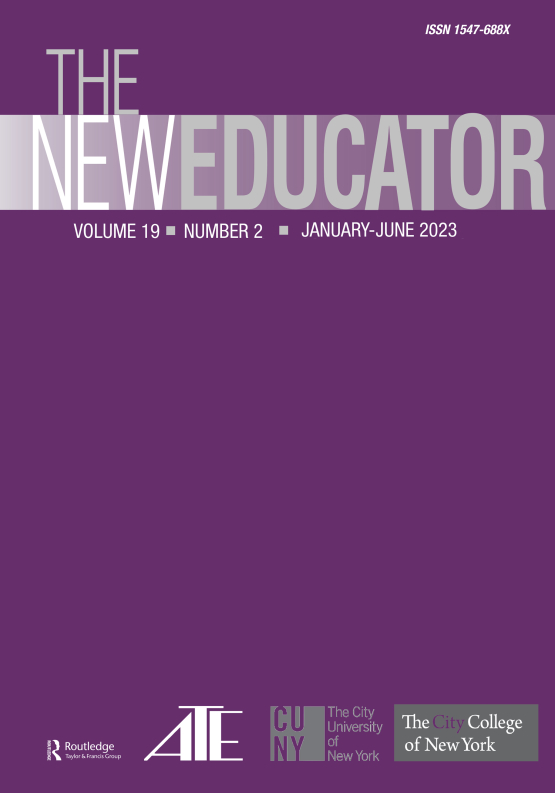Submit a Manuscript to the Journal
The New Educator
For a Special Issue on
The New Educator Special Issue: In-service Teacher Professional Learning
Manuscript deadline
30 September 2024

Special Issue Editor(s)
Shira Epstein ,
CUNY
[email protected]
The New Educator Special Issue: In-service Teacher Professional Learning
The structures and requirements of in-service teacher learning opportunities vary widely. Practicing teachers may participate in school-mandated trainings and workshops, school-based learning communities, and coursework provided through degree-granting programs. They may also engage with more informal structures such as online communities. The New Educator values professional development that assumes an “inquiry stance that builds on teachers’ knowledge and experience” (K. Schultz, 2011, p. 300). We know that such orientations are often not present; nonetheless, we broadly seek to better understand multiple features of in-service teacher learning opportunities, the ways they impact teachers, and the obstacles teachers face in accessing and engaging in them. Finally, we acknowledge a U.S. national context in which most states require continuing education for in-service teachers but only some require graduate coursework. Given these different requirements and the feasibility of states changing their requirements, research is needed to support teacher educators working with in-service teachers, school-building leaders who benefit from advancing teachers’ professional growth, and educational leaders who can influence state and local policymaking regarding in-service teacher learning requirements.
This special issue invites submissions that explore questions about the nature, enactment, and impact of in-service teacher professional learning.
Submissions might consider but are not limited to the following questions:
- How do specific features of in-service professional learning shape teachers’ practices and identities?
- In what ways does in-service professional learning meet or fail to meet teachers’ needs?
- What hurdles do in-service teachers face in accessing and participating in quality professional learning experiences?
- How does technology, including online experiences and communities, mediate teachers’ professional learning?
- How do the varied experiences offered through prominent avenues for teacher learning (e.g., pursuing National Board Certification and graduate degrees) compare to those offered through more local and emergent avenues?
- What are the affordances of culturally responsive/sustaining professional learning experiences for in-service teachers?
- How do pre-service and in-service teacher learning differ?
- How might in-service teacher learning build on pre-service teacher learning?
- How do in-service teachers experience the priorities of their schools in comparison to the priorities of their teacher learning programs? If they perceive the priorities as conflicting, how do they reconcile them?
- How do professional learning experiences leverage the daily clinical work of in-service teachers and draw on their routine engagement with K-12 students, colleagues, and families?
- What role can professional learning play in ensuring teacher retention and quality?
- What policies– for example, salary incentives–motivate teachers to pursue professional learning?
- How might such policies impact teachers’ access to professional learning experiences and promote or restrict equity?
The New Educator is a quarterly peer-reviewed journal, dedicated to exploring topics that are explicitly related to the recruitment, preparation, and induction of educators. We welcome articles focusing on the knowledge created through practice and the challenges of building and sustaining professional community in the education of new educators, The New Educator serves as a forum on issues that teacher educators, teacher education programs, and school systems encounter in the preparation, recruitment, induction, retention, and ongoing support of educators new to the field. Defining “educator” broadly to include classroom teachers, administrators, counselors, support staff, teacher educators, and those who educate outside of school settings, the journal is particularly interested in work that links theory with practice, is generated through practice, is useful and accessible to the field, and reflects the needs and perspectives of the diverse communities served by educational institutions in this new century.
Deadline: September 30, 2024
Looking to Publish your Research?
Find out how to publish your research open access with Taylor & Francis Group.
Choose open accessSubmission Instructions
Guidelines:
- Full research manuscripts should not exceed 6500 words, and please see other manuscript guidelines here.
- Article should be consistent with the scope and aims of The New Educator. See full description here.
- The New Educator receives all manuscript submissions electronically via its ScholarOne Manuscripts site located here.
For more information, please contact Shira Epstein ([email protected])